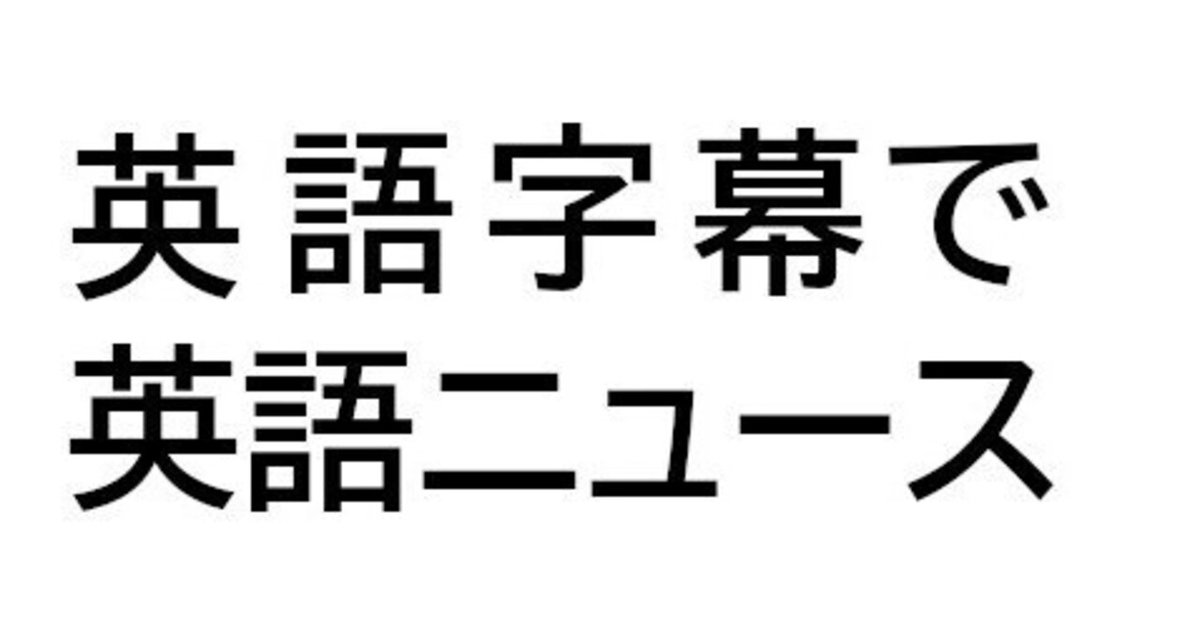
今日の英語ニュース☆2023.04.24☆時事英語・ニュース英語を極める
PBS News Weekend April 23, 2023
今日は上の動画サイトの字幕に多くの誤りや省略があったので(週末版はいつもそうです)、字幕ファイルを作るのはやめて語句の説明だけにしました。下の語句の説明のところの英語は、実際に英語音声を聞いて誤りを訂正し、省略を補足してあります。
いつものような字幕ファイルが必要な人は、リンク先の方法で簡単にできますので自分で作ってください(元の字幕に含まれている誤りや省略はそのままになります)。
週末版の字幕は、翌日以降に比較的正確なものに差し替えられるようです。でも、ニュース番組なので、翌日以降に更新されても…
それでは、今日も一緒に英語のニュースを見ていきましょう!
■ 動画サイトへのリンク
・直接動画サイトを見る場合のリンクです(リンク先字幕の誤りは元のまま)
・分からない言葉はこの2つの辞書でたいてい見つかると思います
[00:00] 今日の番組内容
[01:55] 今日の主要ニュース
[03:42] On the Democratic side, President Biden is expected to announce his re-election campaign later this week. [* バイデン大統領、今週出馬表明へ ]
[04:41]★今日のおすすめ★ 家を間違えて訪ねただけで撃たれる事件が多発 正当防衛の根拠とされる法律(stand your ground law)とは何か
[05:38] [* この法律には、ここで取り上げている問題に関連する2つの部分がある]
Robert Spitzer: Well, there are two parts to the stand your ground laws that are relevant. [* 1つ目は、公の場で襲われたり、身体へ危害を加えられそう、あるいは殺されそうな場合、たとえ安全に逃げることが出来たとしても、逃げる必要はなく、力には力で対抗して相手を殺傷までして構わないという点。] The first is the general idea that if you are in a public place and you are attacked or somebody is about to do you grievous bodily harm or even to kill you, instead of leaving this public place if you could do so safely, which is a standard some states have, stand your ground laws say you can stay where you are and resist force with force even to the extend of killing the other person. So, that is the stand your ground idea, which itself I think is somewhat controversial in legal circles. [* 2つ目は、2005年のフロリダ州法から始まり広がったことで、1つ目の点のような場合、殺傷は正当防衛であると見なして起訴できないとし、それを絶対的かつ反証を許さないとした点。これにより、この法律を根拠に無罪を主張する場合、身体または命への危険を感じたと主張するだけでよく、検察の立証は難しくなった。] But there's an added dimension to this, which began when the state of Florida enacted a heightened stand your ground law in 2005 that not only adopted the stand your ground standard but made it, as they said in the law, an absolute and irrebuttable presumption that an individual who kills or harms another has acted in self-defense and cannot be prosecuted. This began the spread of a heightened stand your ground law in many states that changed the legal presumption. So, if you make a stand your ground claim, all you need to do is say I felt that my life was in danger or that I was going to be grievously harmed. And that standard then places the burden on investigators, police, prosecutors to try and make the case that no, you really didn't face the threat you claim. And this shift in the legal standard has really opened the door wide for people to make stand your ground type claims. And in many instances, not all, obviously, to avoid any kind of prosecution. And that widening of stand your ground, stand your ground on steroids, or some even call it a license to kill or shoot first laws, and that is what has really come to the country's attention in recent years.
[* 辞書の説明 stand your ground law = (law) a law that justifies the use of lethal force when it is necessary to defend oneself against great bodily harm, kidnapping, rape, robbery or any other serious crime without a duty to retreat (wiktionary) スタンド・ユア・グラウンド法、正当防衛法]
[07:30] [* stand your ground law の起源は中世イギリスのcastle doctrine。この原則がどういうものか、そこからどのようにstand your ground lawが派生したのか… このあと英語で説明が続く]
John Yang: Where does this idea come from? Is it rooted anywhere in the -- sort of the history of gun laws in America?
Robert Spitzer: Well, stand your ground laws take an older idea, something called the castle doctrine, an old principle that people may have heard of. The castle doctrine goes back to the Middle Ages, a person's home is one's castle. That is to say, you have the right to retreat into your home and feel safe there and if someone intrudes within your home, you are entitled to defend yourself and not leave your home. That idea goes back to the Middle Ages in Britain. It came to the united states. But in the 19th century, another idea evolved, and that was the stand your ground idea. That is to say, if you are in a public place, the principle of castle doctrine in your home could apply to you in the public realm -- that is to say, instead of safe retreat, which is the legal standard even today in many states, you could meet force with force.
[10:48]★今日のおすすめ★ ディープフェイク( AIで作られた巧妙なフェイク画像・動画 )の問題点
[11:23] [* deepfakeの定義とは ]
William Brangham: Jack Stubbs, thank you so much for being here. Before we get into the weeds [* < to get deep into the weeds = immersed or preoccupied with the details or complexities (of something)] of this, can you just start with a clear definition of what a deepfake actually is?
Jack Stubbs: It's a good question, and it's one that probably a lot more people are asking themselves than they were a few months ago. Deepfake is often the word used to describe a piece of media content that has been created by artificial intelligence. And, typically, you would use deepfake to refer to an AI-generated media content that is also misleading. So, portraying something that hasn't happened.
[* 辞書の定義:A convincingly realistic but fake image, video, or audio created with the use of artificial intelligence, especially one that imposes the face of one person onto the body of someone else. (wiktionary)]
[18:34] 地球温暖化で北極の氷が急速に減少 資源採掘や輸送航路で各国の競争激化
■ おすすめの辞書(時事英語やニュース英語に強い辞書)
■ 英語のラジオを聞く(BGM代わりにCNNやBBC)
■ 英語のテレビを見る(NBC News ・ ABC News)
この記事が気に入ったらサポートをしてみませんか?
